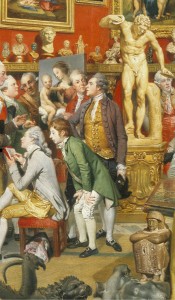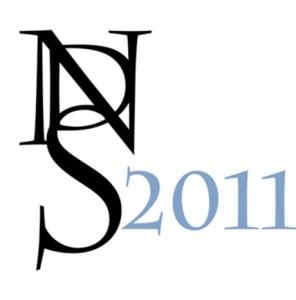David Nichol Smith Conference in Eighteenth-Century Studies
Melbourne, 4-7 July 2011
 The full program for the conference has now been finalised. Papers will be presented over four days from Monday 4th July to Thursday 7th July. Attendees can take out either a full four-day registration or a single day, receptions and conference dinner must be booked in addition to conference attendance. A registration form can be downloaded here David Nichol Smith conference registration 2011 (pdf). Single tickets for the keynotes held at the National Gallery of Victoria can be booked via the NGV, see their website for more detail. There are concession prices for student, unwaged and retired attendees. For all enquiries and to register please contact Jennifer Ellis jennifer.ellis@latrobe.edu.au
The full program for the conference has now been finalised. Papers will be presented over four days from Monday 4th July to Thursday 7th July. Attendees can take out either a full four-day registration or a single day, receptions and conference dinner must be booked in addition to conference attendance. A registration form can be downloaded here David Nichol Smith conference registration 2011 (pdf). Single tickets for the keynotes held at the National Gallery of Victoria can be booked via the NGV, see their website for more detail. There are concession prices for student, unwaged and retired attendees. For all enquiries and to register please contact Jennifer Ellis jennifer.ellis@latrobe.edu.au
Keynote Speakers
Monday 4th July 9:30am Welcome. Keynote by Robert Shoemaker (University of Sheffield): Criminal Lives and the Making of Modern Criminal Justice – William Angliss Centre, A524 – The Auditorium.
Monday 4th July 4pm Elena Marasinova (Moscow State University and Institute of History, Russian Academy of Sciences): The Paradoxes of the Russian 18th Century – William Angliss Centre A524 – The Auditorium.
Tuesday 5th July 9:30am Douglas Fordham (University of Virgina): Nature as Symbolic Form: Painting the English Thoroughbred – NGV International, Clemenger Auditorium.
Tuesday 5th July 9:30am Vincent Denis (University of Paris – Sorbonne): Who are you? Police, papers and identification in 18th century France – State Library of Victoria, Queen’s Hall.
Tuesday 5th July 3pm Constantine Michaelides (Washington University in St Louis, Missouri): View of Skaros: An 18th-century ‘Photographic’ Record of Life and Architecture in the Aegean Archipelago from the Thomas Hope Drawing Collection – State Library of Victoria, Queen’s Hall.
Tuesday 5th July (to follow previous keynote) Shirine Hamadeh (Rice University, Texas and The American University, Beirut): Urban order and the streets of Istanbul’s underworld, 1703-1839 – State Library of Victoria, Queen’s Hall.
Wednesday 6th July 3:20pm Chloe Chard (Independent scholar, London): Socializing with Sculptures: Gossip, Laughter and the Studio Visit – William Angliss Centre, A524 – The Auditorium.
Wednesday 6th July (to follow previous keynote) Wendy Bracewell (School of Slavonic and East European Studies, University of London): Writing Back to the Republic of Letters: Western Travellers and Southeast European Travelees – William Angliss Centre, A524 – The Auditorium.
Thursday 7th July 2pm Karin Wolfe (The British School at Rome): Francesco Trevisani (1656-1746): a Venetian Painter in Rome – National Gallery of Victoria (International), Clemenger Auditorium.
Thursday 7th July (to follow previous keynote) Mark Ledbury (University of Sydney): David and Degotti – National Gallery of Victoria (International), Clemenger Auditorium.
Receptions
Monday 4th July 6pm – Reception at The Johnston Collection House Museum in East Melbourne.
Tuesday 5th July 5pm – Reception at the State Library of Victoria.
Wednesday 6th July 7pm – Conference Dinner at Trunk.
Thursday 7th July 6:30pm – A program of Italian and Italian-inspired music of the eighteenth century in the Tiepolo room at the National Gallery of Victoria (International).
List of speakers and papers
For full details of session times and locations download the program here: 14th DNS Conference Programme (pdf).
Shama Adams: Origins and Speculations: Sir John Soane’s Museum and the Enlightenment
Matthew Allen: Georgia and New South Wales: Philanthropic Colonisation and the Problem of Alcohol in the long Eighteenth-Century.
Robert G W Anderson: An Eighteenth-Century Correspondence: the Case of Joseph Black
Janine Barchas: What Jane Saw
Lisa Beaven : ‘It is nothing but a naked, withered down’: The Grand Tourist’s response to the Roman Campagna
Barbara M. Benedict: ‘The Foremost Toyman of His Time’: Sir Hans Sloane and the Reputation of the Antiquary in Eighteenth-Century Britain’
Michael Bennett: Immunising the sovereign and the state: smallpox inoculation among the ruling families of Europe in the 1760s and 1770s
Laurie Benson: Joseph Wright of Derby in Melbourne
Wendy Bracewell: Writing Back to the Republic of Letters: Western Travelers and Southeast European Travelers.
Jacqueline Broad: Reflections on Happiness: Mary Astell’s letters to Ann Coventry
David Burchell: Salamanders and Spectators: Debates over Gender-Roles in the Periodical Literature of the early Eighteenth Century
Chloe Chard: Socializing with Sculptures: Gossip, Laughter and the Studio Visit
Katie Charles: Staging Sociability contra Garrick: Theatricality and Performativity in Frances Brooke’s The Excursion
Will Christie: The Public Lecture in the Knowledge Economy of the Late Eighteenth Century
Georgina Cole: Seeing is feeling: eighteenth-century images of the blind
Dierdre Coleman: Domination, Slavery and Empire
Ian Coller: Barbary and Revolution: Rethinking Europe and Islam in the Eighteenth Century
Melanie Cooper-Dobbin: The Satyr’s Howl: Charles-Andre Van Loo’s Apollo Flaying Marsyas
Lisa Curtis-Wendlandt: Letters to the self: Elise Reimarus’ Reflections on sexual difference and woman’s role within the state
Amelia Dale: The Quixotic Imagination in Eaton Stannard Barrett’s The Heroine (1813)
Sing d’Arcy: Fiesta y siesta: the role of the organ in the configuration of festive space during the Iberian Baroque.
Joanna de Groot: Imagining “Persia”: commerce, fantasy, and power in European accounts of eighteenth century Iran
Anthony Disney: Some Reflections on Pombal and Enlightened Despotism in Portugal (1750-77)
Paola Di Trocchio: The Lives of an 18th Century Man’s Coat
Andrew Evans: From Foghorns to Fanfares: the Ship’s Trumpeters of the Dutch East Indies Company 1700-1796
Douglas Fordham: Nature as Symbolic Form: Painting the English Thoroughbred
David Garrioch: Protestants and citizenship in 18th century France
John Gascoigne: The Enlightenment, the Pacific Laboratory and Natural History
Vivien Margaret Gaston: Dance and Deportment in 18th century British portraits
Leigh-Michil George: Sentimental Spectacle and Caricature in Alexander Bicknell’s Painting Personified (1790)
Paul Gibbard: Octavie Belot’s political correspondence, 1759-1792
Christopher Gibbs: Friends and Enemies: the Underground War Between Great Britain and France, 1793-1802
Katrina Grant: Visions of Arcadia: Filippo Juvarra’s naturalistic settings for early Eighteenth-Century Roman Opera
Karen Green: Self and Other in the Lettres d’une Péruvienne of Mme de Graffigny
Shirine Hamadeh: Urban order and the streets of Istanbul’s underworld, 1703-1830
Maureen Harkin: ‘Trinkets of Frivolous Utility’: Adam Smith, Material Culture and the Social Life of Things.
Jocelyn Harris: Jane Austen, the Duke of Clarence and the Hottentot Venus
Frank Heckes: Goya’s Demons, Monsters, Witches and Goblins: Reason and Un-Reason in Eighteenth-Century Spain
Rod Home: A Scientific News Service in Late-Eighteenth-Century London
Aleksondra Hultquist: Collecting Passions and the Value of Haywood’s Early Novels
Laura Jocic: Men in Banyans: informal men’s dress in the eighteenth century
Adrian Jones: Representing (Dis)Honour in Peace? – An Ottoman case study from 1711
Kathleen Kiernan: Dutch Art in the English Landscape: The presence of seventeenth-century Dutch landscape prints in the eighteenth-century London art market and their influence on the British landscape art tradition.
Grahame Kime: Stairway to Heaven-The Geometry of Poussin’s Religious Paintings
Wallace Kirsop: Editing the Correspondence of Antoine Court de Gébelin (1725-1784): a Problematic Project
Megan Kitching: Goldsmith’s The Citizen of the World: Persona, Patriotism and the Problems of Professional Authorship.
Gareth Knapman: Constructing the ethnic nation: The barbarian, liberty and ethnic patriotism in the Late British Enlightenment
Mark Ledbury: David and Degotti
Ferdinand C. Llanes: Voyage from Manila to Ayudhya: Spanish Diplomatic Engagement in Siam
Tomaso Manfredi: ‘Il Costantino Pio’, 1710. Inside the Opera: Architecture, Poetry and Society in the Rome of Pietro Ottoboni and Filippo Juvarra
Elena Marasinova: The Paradoxes of the Russian 18th Century
David R. Marshall: Ruins and Role-Playing: The Villa Patrizi and the Eighteenth-Century Italian Romitorio
Matthew Martin: Porcelain Monks and Nuns
Sophie Matthiesson: Negotiating a future: court artists in the prisons of the French Revolution
Peter McNeil: The Eighteenth-century English and French Man’s Waistcoat: Erotic Field
Peter McPhee: “My strength and my health are not great enough”: Maximilien Robespierre, the French Revolution, and physical collapse
Marc Mierowsky: Defoe the Petitioner
Jennifer Milam: Cosmopolitanism in the eighteenth-century garden
Adelina Modesti: Fashioning the Grand Ducal Family: Vittoria della Rovere and the importation of French luxury goods in early modern Florence.
Olivia Murphy: ‘We are apt to blame Clarissa herself’: Richardson, Blackstone and the law of rape
Michael Nicholson: “Floating Towns”: The Globalized Gypsy in Colquhoun, Wordsworth & Thelwall”
Christine Owen: Migration and The True-Born Englishman
Anthony Page: Rational dissent, enlightenment and abolition of the British slave trade
Eric Parisot: Eighteenth-Century Suicide Notes: After Sentimentalism
Nicola Parsons: “Those Verses appear here amongst the other Paper Rubbish”: Jane Barker, Poetry and Narrative Form
Barbara Pauk: A visit to the graves of Paul and Virginia: England’s appropriation of a French text
Jessica Priebe: Framing Paphos: Horace Walpole’s Shell Seat at Strawberry Hill
Jennifer Ridden: Papal Antichrists, Recurring Reformation Nightmares, and Godless Rationalists: the apocalyptic genre and the new world order, 1780s-1820s
William E. Rivers: Authorship, Identity, and the Craftsman: The Dominance of Amhurst’s Voice Among Many
Shef Rogers: Conveying True Desolation in Early Eighteenth-Century Prose
Laura Ruch: Privacy Between ‘Writer’ and Audience: Relationship-Regulating Language in the Public Domain of Women’s Epistolary Novels, France and England, 1670-1770
Paul Rule: China and the Suppression of the Jesuits
Susan Scollay: Politics, pleasure and precedent: Ottoman palace architecture in the era of Sultan Ahmed III, r. 1703-1730.
Mark Shepheard: Friendship, Music and the Love of Painting: Musicians, Painters and Portraits in Eighteenth-Century Europe
Robert Shoemaker: Criminal Lives and the Making of Modern Criminal Justice
Mary Spongberg: Mary Hays’ Obituary of Mary Wollstonecraft and the history of feminism
Elizabeth Sund: Female Interlocutors: Philosophical Correspondences between Catharine Cockburn and Anne Arbuthnot (1731-1748)
Paul Tankard: Anonymity and the Press: The Case of Boswell
Chip Van Dyk: Déja Brew: Influences of Political Economy before the Virtuosi brought Coffee to France
Gerard Vaughan: Public Access to Private Collections of Graeco-Roman Antiquities in late-18th century London
Robert Wellington: The frontispiece for Médailles sur les Principaux Événements du Regne de Louis Le Grand.
Barbara Witucki: A Milkmaid Who Becomes A Queen, A Queen Who Becomes A Milkmaid, and A Cottage Industry of Conspicuous Consumption
Karin Wolfe: Opera and Painting at the Ottoboni Court: Francesco Trevisani’s Apelles and Campaspe
The conference is supported by La Trobe University, The Gordon Darling Foundation, The Ian Potter Foundation and the National Gallery of Victoria.


Looks realy good, how do i register to attend
david holyoake
Hi David,
You can download the registration form from the link in the post (see link labelled David Nichol Smith conference registration 2011) and then email it to Jennifer Ellis at La Trobe jennifer.ellis@latrobe.edu.au